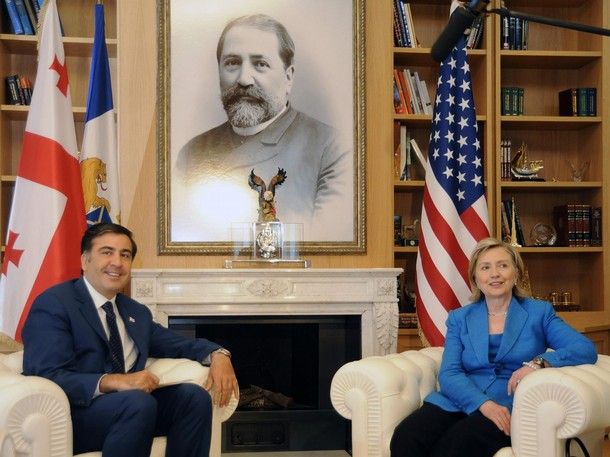
A recent visit of the US Secretary of State to the Caucuses Hillary Clinton once again draw the world attention to the problems of the region. VK interviewed one of the leading experts on these issues Alexandros Petersen, senior fellow with the Atlantic Council’s Dinu Patriciu Eurasia Center.
Do you think it was done on purpose that Clinton’s visit to the region practically coincided with president Medvedev’s visit to the US?
Secretary Clinton’s visit to the region should be seen in a broader context of the US policy both: towards Russia and Eurasia. It is important for the US administration. The have been criticized that their Russian reset idea is really “Russia first” policy, and that they are ignoring the countries of the Caucuses, Central Asia and the Black Sea region. And so it would be appropriate to say that Secretary of State Clinton’s visit in some way a way of shoring up the relationships with countries like Ukraine, and the three countries of the Caucuses. Secretary Clinton’s trip was planned a long time ago, in fact I think before the exact date for Obama-Medvedev meeting was set. So there isn’t a direct connection but it should be seen in the same context. Obama administration is very cognize of the need to maintain strong relationships with the countries of the Caucuses in the context of the Russian reset.
And what about Washington’s attitude towards Georgian issue? Has it changed under Obama administration?
Unfortunately, it’s not so much a policy change between Obama and Bush administration, as much as it is policies of the United States and other countries in the West being dictated by the realities on the ground in Georgia. So, frankly, there’s not much the US or the western institutions like NATO or EU can do in Georgia with the current situation. There is very few options. And what Secretary Clinton made a point of saying that there is in fact an occupation of Georgia. That was a major disagreement with her Russian counterpart, obviously. But beyond underscoring the fact that the Russians have yet to withdraw from certain areas, and they said they would, and underscoring that it is an occupation from the standpoint of the United States and most of the international community, and that they don’t recognize Russian, or they don’t agree with it the Russian recognition of Abkhazia and South Osetia as independent states. That’s really all that can be done at the moment. So the hands of the United States are tide on Georgia right now. It is not much one can do, because the situation is very unfavorable on the ground.
There is another troublesome spot: Nagorny Karabakh. The first country Clinton visited was Azerbaijan and, of course, this issue was discussed during talks with president Aliev. What role can the United States and the world community play in resolving this issue and is it time to raise it again?
It is certainly and issue of immense importance for the region and for Europe, for European security, for NATO security. It’s incredibly important vis-à-vis the US efforts in Afghanistan, because of the supply route. One of the main supply routes for non-legal supplies goes through the Caucuses, because of the Georgia and Azerbaijan. And so the Nagorno-Karabakh conflict is from my view, as an independent analyst, incredibly important and really is something that the United States and Western institutions need to focus on much more than they have. The unfortunate thing is that it has not received nearly as much attention as it should and there is not really a clear policy yet on the part of the Obama administration as to how they are going to approach Nagorny Karabakh. What makes it incredibly difficult is that: number one – the Minsk group process is basically not producing any serious results. What makes it difficult is also that the Armenian and Azerbaijani positions are so absolute on both sides that it is very difficult to come to a consensus. Though even that there is an agreement on basic principles as part of a Minsk group process, and both governments agree on the basic principles, or have in the past agreed on the basic principles, it’s difficult to find as a mediator, on the part of the United States as one of the Minsk group co-chairs, to come to consensus, or bring the parties to a consensus. But I think the main obstacle is not so much that. The main obstacle is that has been a lack of effort on the part of the US and the Western countries and institutions. No one is trying as hard as they should to be the mediators of Nagorny Karabakh. And an unfortunate thing is, as we saw here not so long ago, only a week and a half ago, that current situation is completely unstable and can potentially erupt on a moment’s notice. No one is going to win out of a renewed major conflict in Nogorny Karabakh. And so the United States and the Western world need to try a lot harder to resolve this conflict.
Alexandros Petersen is a nonresident senior fellow with the Atlantic Council’s Dinu Patriciu Eurasia Center. This article was originally published by Vestnik Kavkaza. Photo credit: Reuters Pictures.
Image: HClinton%20and%20Saakashvili%20sitting.jpg
